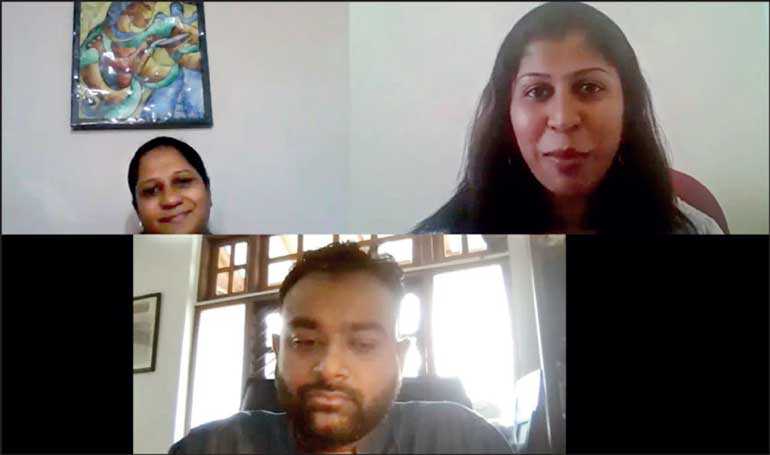Tuesday Feb 24, 2026
Tuesday Feb 24, 2026
Saturday, 9 January 2021 00:02 - - {{hitsCtrl.values.hits}}

From left (top to bottom): Women in Need Senior Legal Officer Dilukshi Shanika Wijesinghe, MediaCorps Fellow Nirasha Piyawadani, Country Director of Cosmec Sri Lanka Asela Waiddyalankara
By Stephanie Lazarus
With the rise in cases citing gender-based violence caused by lockdowns around the world, the year 2020 called for rigorous action in eliminating and preventing violence against women. Therefore, 16 days were observed under the slogan 16 days of activism from 25 November-10 December, under the theme ‘Orange the world, fund, respond, prevent, collect’. The aim of the campaign is to create wider awareness, build networks for solidarity, and take consistent action to stop and eliminate all forms of gender-based violence.
On 10 December, to mark the international human rights day and to contribute to the 16 days activism, The Sri Lanka Development Journalist Forum conducted the first ever Facebook Live discussion as part of its MediaCorps Watch program on the title ‘How to block online gender-based violence? Let's UNiTE against #iGBV.’
Women in Need Senior Legal Officer Dilukshi Shanika Wijesinghe and Cosmec Sri Lanka Country Director Asela Waiddyalankara, were featured as the speakers of the discussion that was moderated by MediaCorps fellow Nirasha Piyawadani. The discussion mainly focused on (i) creating awareness on ways in which women can fall prey to online gender-based violence, (ii) community and government level steps that can be taken to prevent the recurrence of cyber violence and (iii) the need for discourse and dialogue around the subject.
“Online GBV is the second biggest form of gender-based violence that is reported in Sri Lanka, out of which majority of the complaints are related to women being harassed by their partners through means of manipulation using online content provided voluntarily or involuntarily, while some complaints cited the use of ‘catfishing’ on social networking services, especially among girls between the age of 14-18 years, added Dilukshi Wijesinghe.
“With the exponential increase of online gender-based violence, I believe we are at a crucial juncture to develop digital literacy among our society – especially among our children as they are the most vulnerable. It is important now more than ever to understand how social media tools work in order to keep these predators at bay. Therefore, providing education to children to know how to set boundaries while stepping into the ‘cyberspace’ is vital,” highlighted Asela Waidyalankara.
The Country Director of Cosmec Sri Lanka further noted, “Privacy rules and regulations and the measures that can be taken against the violation of someone’s rights differ from one social network service to another. Steps that can be taken to report content on Facebook is different to what can be done on WhatsApp. Content that can be shared on a FB group cannot be taken down as easily as that of a public account. These distinct methodologies need to be understood by those who frequent social media platforms.”
He added, “It starts from the basic principle of ‘not sharing one's password with another under any circumstance’. He went on to say that certain social media platforms do not comply with requests to remove content by an aggrieved party on grounds of ‘lack of adequate information’, in this case it is vital to understand the ways in which information can be protected from the get-go.
According to Waiddyalankara, the fact that 60% of males in Sri Lanka use social media as opposed to the female population especially after considering the country’s population is predominantly females is an indication that females don’t consider the internet to be a safe space. He points out, that in his opinion the CID Cyber Crimes Unit does not have the adequate tools to conduct digital forensics to trace perpetrators nor the training to promptly conduct these activities precisely.
A report compiled by UN Women learns that, “With more than half of the world’s population experiencing lockdown conditions by early April quarantine measures and self-isolation policies had increased internet usage between 50% and 70%. As a result, women and men turned to the internet for work, school, and social activities. During this period, users with limited digital skills were more at risk of cyber-violence. Concerningly, this resulted in women and girls being at a higher risk for these forms of violence. In this context, Women and girls are subject to online violence in the form of physical threats, sexual harassment, stalking, zoombombing and sex trolling.
Specific cases have been documented by media and women’s rights organisations of unsolicited pornographic videos displayed while women were participating in online social events, threats of violence and harmful sexist content, and ‘zoom bombing’ during video calls showing racially charged and sexually explicit material to the unexpecting participants. (UN women, 2020)
“How do you determine cyber GBV? If someone is being subject to a form of manipulation or ‘black mail’ for financial gain or an act of revenge in cyberspace that is an indication of violence, said,” Women in Need Senior Legal Officer Dilukshi Shanika Wijesinghe.
It is important for us to give more gravity and focus on the changing patterns of gender-based violence taking into account the growth of technology and the global pandemic situation. MediaCorps watch is committed to providing factual information to its audience to create wider awareness on digital literacy and prevent our younger generation from Cyber-GBV.
The discussion, first of its kind, on cyber GBV was held with the use of #iGBV. Join the conversation using the hashtag on Twitter or any other social media platform or send your feedback to [email protected].
(The writer is Program Coordinator, SDJF.)